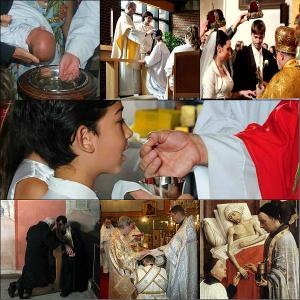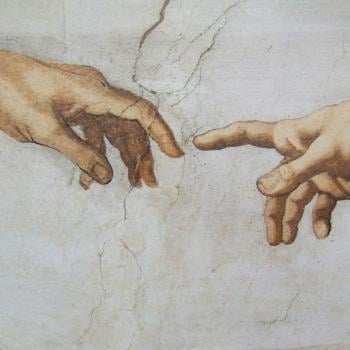
When talking about sacraments, we must distinguish the ritual aspect of the sacrament, the accidents associated with the sacrament, and the grace or the thing of the sacrament itself. The ritual elements and the accidents can be had without the grace or thing of the sacrament, for example, because the intention to perform the sacraments is not there. This is why baptizing someone in a play or a movie is not actually engaging the sacramental thing of baptism: their intention is not to baptize but to pretend to baptize. There can also be the thing of the sacrament, the sacramental grace, without the ritual and the accidents which go along with it. When talking about the sacramental grace, the thing of the sacrament, we usually name it by the name of the sacrament, which sometimes causes confusion because talk about the sacraments can sometimes be talk only of the sacramental grace; is this not the case when talking about the necessity of baptism for salvation? The thing of baptism, the sacramental grace, is what is needed, which is why those who are not baptized (that is, who do not undergo the normative ritual) can still be saved, for it is possible to receive that grace in extraordinary fashion apart from the ritual (hence, baptism of desire). The same, to the surprise of many, can be said about the eucharist: we can receive the grace and thing of the eucharist without the sacramental performance, indeed, in the eschaton we will receive the grace in that fashion. Just as baptism can be said to be necessary for salvation as long as it is understood that what is needed is the thing of the sacrament, the grace involved, so the eucharist can be said to be necessary for eternal life, but once again, what is needed is what actually given by the eucharist, the grace of the eucharist, the reality of the eucharist, and not the form in which it is normally received in its sacramental presentation. St. Albert the Great, understanding this, said:
Now if somewhere they are not found at some time, and this happens not from contempt of religion but from the necessity of the situation, we say with Augustine that God has not bound grace to his sacraments, but that he can work his sacramental grace in those with faith and devotion towards the sacrament even without the sacraments. And this is called spiritual reception of the sacrament, and in this sort of case Augustine says, “For what do you prepare the teeth and belly? Believe, and you have eaten.” Similarly, he who is excluded from baptism, not by contempt of religion, but by the necessity of the situation, does not lose the fruit of baptism but is considered baptized with the baptism of fire in the Holy Spirit. The spiritual eating by which we are incorporated into Christ is ordered to this, as has been said above. [1]
When dealing with the ritual and the accidents of an sacrament, we find, they are symbolic in nature; the symbols involved present to us something of the reality which is being received, which is why, by their nature, sacraments can be said to be real symbols. That is, they are symbols which contain within them the reality which is being presented in and through those symbols. The eucharist is symbolic even as it presents to us, through various symbols, the real presence of Jesus. Bread is used for communion to point to us that we receive the true bread, the bread of life, which is Jesus. Lanfranc of Canterbury, who understood all sacraments were symbolic, made it clear that their symbolic nature did not undermine the reality of the sacrament itself:
For sacraments always bear a likeness to those things of which they are sacraments, just as in this sacrament, that is, the sacrament which we are now discussing. When the Host is broken, when the blood from the chalice is poured into the mouths of the faithful, what other is designated than the immolation on the cross of the body of the Lord and the effusion of blood from his side? Otherwise it would not be a sacrament, that is, if by the understanding of the name of sacrament in the way in which we now understand it, and in which we also think that it is understood by readers or hearers. [2]
Neither the ritual, nor the symbols employed in and with that ritual, is the most important element of the sacrament, for that, of course, is found in the reality presented to us through the sacrament, and the grace which comes to us through that reality. Nonetheless, this does not mean the ritual with its symbols are not important. The symbols help us understand what it is we are receiving. They provide the means by which we can normally receive the thing or grace of the sacrament. That is, when the ritual is followed properly, that is, when it the requirements for the ritual are fulfilled, we can have faith that the ritual will bring with it the sacramental thing to those who participate in it. That is, thanks to the work of the Holy Spirit and the institution of the sacraments by Christ, the church has been given a norm by which its members receive the thing of the sacrament themselves. But God is not bound by the sacraments, that is, God is not bound to the ritual, requiring it to give us grace, and so can and does offer grace to others in their own particular circumstances:
According to the teaching of the Holy Church, the effect of Christ’s grace is not limited to church sacraments alone but has various forms. Consequently, my comparison of an unbelieving priests to an unbelieving historical actor has the following meaning: as grace of one form (church-sacramental) also has its power in the unbelieving performer of the sacrament, so too grace of another form (moral-practical) can have its power in an unbelieving public actor. In both cases, grace does not act through faith: in the first it acts through the apostolic station of a holy servant for the spiritual good of people; and in the second, though the historical vocation of a societal actor for the practical good of the same people. However, it is possible to express my argument more directly and more forcefully by taking for an example the sacrament of holy baptism in place of the sacrament of holy offering. In actual fact, if a simple layman, or even a pagan, can perform of the sacrament of holy baptism according to need, then he can serve Christ all the more in the performance of His historical concern. [3]
The sacrament of the eucharist is important. The norms established by the church for how the grace of the sacrament will be given is important. God is not bound by the sacraments, but God has bound the sacraments to grace, and through them, we know we can receive graces which we need, even as others, apart from them, can also receive those graces if God chooses to give those graces to them.
It can be said that the eucharist is what makes the church, for through the eucharist, we receive the body of Christ and become that which we receive, that is, the body of Christ:
No reason can be given why the Church is called and is the body of Christ, except in the way which has been mentioned, that by giving his body to it, he turns it into himself so that it becomes his body, and the individual members are his members. So it is that the Church is called the body of Christ mystically or metaphorically. For every mystical transfer takes place by appropriation to something else that nevertheless is given the sane name and the same concept. This is nothing other than communion in the body and blood of the naturel and true Christ; for which he pours it into the Church, he turns the whole Church into himself, and is not changed from his own nature; and by making her like himself by the Spirit of life and the life-giving warmth of truth and the operation of the virtues, as by as certain operation of the members, he makes the Church his own spiritual and mystical body. [4]
Just as we can and should distinguish the thing of the sacrament from the symbolic form in which that thing is given, so we can distinguish the thing of the church, the mystical body Christ in which all who are saved will participate in, with the external presentation of that thing which comes to us in and through the institutional church. That is, the church can be said to be a sacrament, with the things of the sacrament being connected with but transcendent to the presentation of that reality in its symbolic form. This is why Vatican II says the reality of the church, the body of Christ, subsists in, or is found in, the Catholic Church. We see the sacramental distinction at play here, with the sacramental reality or thing of the church being one thing, and the sacramental form or the institution, being another.
When we talk about the church, just like with other sacraments, we sometimes talk about it in relation to the thing itself, but sometimes in relation to the sacramental or symbolic element involved. The thing in itself can be said to be the eschatological church, the unity of humanity as it is saved and made one in Christ. Traditional theological discussions exploring the necessity of being a part of the church means this: people need to receive the grace which allows them to join in the eschatological church, and so be included in the thing of the church itself. As grace is not bound by the sacraments, this means those who are not found or connected with the institutional church can still find themselves receiving that grace and so being a part of the eschatological church. But just as the possibility of receiving the thing of the sacraments apart from the norm in which it is received does not undermine the value of the sacraments themselves, so being able to attain the grace and inclusion into the thing of the church does not denigrate the institutional church. Those who authentically join themselves to the institutional church join themselves to the thing of the church itself. Vatican II, working with this distinction in Lumen Gentium, declared:
So likewise the new Israel which while living in this present age goes in search of a future and abiding city is called the Church of Christ. For He has bought it for Himself with His blood, has filled it with His Spirit and provided it with those means which befit it as a visible and social union. God gathered together as one all those who in faith look upon Jesus as the author of salvation and the source of unity and peace, and established them as the Church that for each and all it may be the visible sacrament of this saving unity. While it transcends all limits of time and confines of race, the Church is destined to extend to all regions of the earth and so enters into the history of mankind. Moving forward through trial and tribulation, the Church is strengthened by the power of God’s grace, which was promised to her by the Lord, so that in the weakness of the flesh she may not waver from perfect fidelity, but remain a bride worthy of her Lord, and moved by the Holy Spirit may never cease to renew herself, until through the Cross she arrives at the light which knows no setting.[5]
All those who are recognized as holy men and women before Christ, and so considered to be saints, are a part of this transcendent reality; that is, they have their place in the eschatological church which is not bound by place or time. Thus, though in their own life, they certainly had nothing to do with the Christian faith, as they knew nothing of it, but rather, they lived their life with faith in God in relation to what they knew and understood from the revelation given to them, they still can and will receive the graces they need for their salvation. They had nothing to do with the Christian sacraments, but whatever is necessary in them, the thing in the sacraments, they either have or will receive in order to find their proper place in the eschaton. What is true for them, can be true for others; God is not looking to judge and condemn people, but to offer the means of salvation, and so we have hope that God can and will make it possible that all can be saved.
While the institutional church is important, it should not become prideful in that importance, thinking that its relationship with the transcendent church of Christ is univocal, making it that its leaders can control who will and who will not be saved based upon the relationship people have with them. We should not threaten perdition upon those who have reasons to fear inclusion in the institutional church, such as if they have experienced abuse by it.
When the institutional church fails to live out its obligations, the expectations Christ gave to it when he set it up, the expectations that it serves the world out of love instead of demanding to be served by it, it needs reform. It needs to remember the sacramental nature of the church, to realize that it does not control God through its existence, but rather, it is meant to serve God and the world in human history. It needs to properly understand the eucharist, to know it is meant to be a sign of love to the world. When the institutional church uses the eucharist in a way contrary to that love, it undermines the symbolic element of the sacrament, and with it, what can and should be learned from that symbol. The eucharist must always include with it a sign of bonding and of love. The eucharist should not be treated as some sort of magical talisman, some sort of gift given merely for individual gain. When is treated as a thing to control and use to manipulate people, though the grace in it will remain, its symbol and value will be undermined. Such actions will bring discord into the institutional church, leading to many people questioning the sacrament and their need for it. The church, in order to truly establish a “eucharistic revival” must engage the symbols presented in the eucharist, symbols which promote the bond of love and the unity the Christians should have with each other: “Therefore, the Church prays that we may be one body in Christ, one Church, namely that which is signified, so that now, that is, when we eat, these sacraments may truly perfect in us the one body of Christ and the one Church which they signify.” [6] When the reality of the sacrament, the thing in itself, is the only thing explored or discussed, we have lost the value of the sacrament and the form in which it comes to us. We are given the eucharist as bread and wine to show us that we are receiving the bread of life, but also, to show how we, can, and should become like the bread, to come together as become one, even as Christ is one. Ignoring the symbolic nature of the eucharist, indeed, denying it is there, is one of the reasons why the eucharist is no longer appreciated by so many. The same, however, is true, not just with the eucharist, but the church as a whole; the church is a sacrament, and as a sacrament, it must engage the symbolic form if it is to be true to its mission in the world.
[1] St. Albert the Great, On the Body of the Lord. Trans. Sr. Albert Marie Surmanski, OP (Washington, DC: CUA Press, 2017), 322-23.
[2] Lanfranc of Canterbury, “On the Body and Blood of the Lord” in Lanfranc of Canterbury: On the Body and Blood of the Lord and Guitmund of Aversa: On The Truth of the Body and Blood of Christ in the Eucharist. Trans. Mark G. Vaillancourt (Washington, DC: Catholic University of America Press, 2009), 54-5.
[3] Vladimir Soloviev, The Karamazov Correspondence. Letters of Vladimir S. Soloviev. Trans. and ed. Vladimir Wozniuk (Boston: Academic Studies Press, 2019), 184 [Letter to the Moscow Gazette, October 26, 1891].
[4] St. Albert the Great, On the Body of the Lord, 138-9.
[5] Vatican Council II. Lumen gentium. ¶9.
[6] Guitmund of Aversa “On The Truth of the Body and Blood of Christ in the Eucharist” in Lanfranc of Canterbury: On the Body and Blood of the Lord and Guitmund of Aversa: On The Truth of the Body and Blood of Christ in the Eucharist. Trans. Mark G. Vaillancourt (Washington, DC: Catholic University of America Press, 2009), 171.
Stay in touch! Like A Little Bit of Nothing on Facebook.
If you liked what you read, please consider sharing it with your friends and family!
N.B.: While I read comments to moderate them, I rarely respond to them. If I don’t respond to your comment directly, don’t assume I am unthankful for it. I appreciate it. But I want readers to feel free to ask questions, and hopefully, dialogue with each other. I have shared what I wanted to say, though some responses will get a brief reply by me, or, if I find it interesting and something I can engage fully, as the foundation for another post. I have had many posts inspired or improved upon thanks to my readers.













